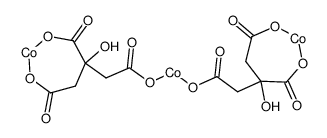866-81-9
| 中文名 | 柠檬酸钴 |
|---|---|
| 英文名 | cobalt(2+),2-hydroxypropane-1,2,3-tricarboxylate |
| 英文别名 |
MFCD00150521
Cobalt citrate Citric acid,cobalt(2+) salt (2:3) COBALTOUS CITRATE EINECS 212-751-3 Tricobalt dicitrate |
| 沸点 | 309.6ºC at 760mmHg |
|---|---|
| 熔点 | 150ºC (dec.) |
| 分子式 | C12H10Co3O14 |
| 分子量 | 554.99900 |
| 闪点 | 155.2ºC |
| 精确质量 | 554.80700 |
| PSA | 281.24000 |
| 外观性状 | Powder | light purple |
| 储存条件 | 2-8°C,惰性气体,避光 |
| 计算化学 | 1.疏水参数计算参考值(XlogP):无 2.氢键供体数量:2 3.氢键受体数量:14 4.可旋转化学键数量:4 5.互变异构体数量:无 6.拓扑分子极性表面积281 7.重原子数量:29 8.表面电荷:0 9.复杂度:211 10.同位素原子数量:0 11.确定原子立构中心数量:0 12.不确定原子立构中心数量:0 13.确定化学键立构中心数量:0 14.不确定化学键立构中心数量:0 15.共价键单元数量:5 |
| 更多 | 1. 性状:未确定 2. 密度(g/mL,25/4℃):未确定 3. 相对蒸汽密度(g/mL,空气=1):未确定 4. 熔点(ºC):150°C (dec.) 5. 沸点(ºC,常压):未确定 6. 沸点(ºC,5.2kPa):未确定 7. 折射率:未确定 8. 闪点(ºC):未确定 9. 比旋光度(º):未确定 10. 自燃点或引燃温度(ºC):未确定 11. 蒸气压(kPa,25ºC):未确定 12. 饱和蒸气压(kPa,60ºC):未确定 13. 燃烧热(KJ/mol):未确定 14. 临界温度(ºC):未确定 15. 临界压力(KPa):未确定 16. 油水(辛醇/水)分配系数的对数值:未确定 17. 爆炸上限(%,V/V):未确定 18. 爆炸下限(%,V/V):未确定 19. 溶解性:未确定 |
|
Section 1: Product Identification Chemical Name:Cobalt (II) citrate hydrate CAS Registry Number:866-81-9 Formula:Co3(C6H5O7)2.XH2O EINECS Number:212-751-3 Chemical Family:salt of an organic acid Synonym:Citric acid, cobalt salt.
Section 2: Composition and Information on Ingredients IngredientCAS NumberPercentACGIH (TWA)OSHA (PEL) Title Compound866-81-9100%0.02mg/m3no data Section 3: Hazards Identification Emergency Overview:Irritating to skin, eyes and respiratory tract. Limited evidence of a carcinogenic effect. Primary Routes of Exposure:Contact with skin and eyes. Dust inhalation. Eye Contact:Causes slight to mild irritation of the eyes. Skin Contact:Causes slight to mild irritation of the skin. May cause dermatitis. Inhalation:Irritating to the nose, mucous membranes and respiratory tract, and cause shortness of breath. No consistent information is available on the physiological effects of ingestion of large amounts. May cause Ingestion: polycythemia. Acute Health Affects:Irritating to skin, eyes and respiratory tract. Chronic Health Affects:No information available on long-term chronic effects. Limited evidence of a carcinogenic effect. NTP:No IARC:Yes OSHA:No SECTION 4: First Aid Measures Immediately flush the eyes with copious amounts of water for at least 10-15 minutes. A victim may need Eye Exposure: assistance in keeping their eye lids open. Get immediate medical attention. Wash the affected area with soap and water. Remove contaminated clothes if necessary. Seek medical Skin Exposure: assistance if irritation persists. Remove the victim to fresh air. Closely monitor the victim for signs of respiratory problems, such as difficulty Inhalation: in breathing, coughing, wheezing, or pain. In such cases seek immediate medical assistance. Ingestion:Seek medical attention immediately. Keep the victim calm. Give the victim water (only if conscious). SECTION 5: Fire Fighting Measures Flash Point:not applicable Autoignition Temperature:none Explosion Limits:none Extinguishing Medium:carbon dioxide, dry powder or foam If involved in a fire, fire fighters should be equipped with a NIOSH approved positive pressure self-contained Special Fire Fighting Procedures: breathing apparatus and full protective clothing. Hazardous Combustion andIf involved in a fire this material may emit toxic organic fumes. Decomposion Products: Unusual Fire or Explosion Hazards: No unusual fire or explosion hazards. SECTION 6: Accidental Release Measures Spill and Leak Procedures:Small spills can be mixed with vermiculite or sodium carbonate and swept up. SECTION 7: Handling and Storage Handling and Storage:Store in a sealed container. Keep away from heat and moisture. SECTION 8: Exposure Controls and Personal Protection Eye Protection:Always wear approved safety glasses when handling a chemical substance in the laboratory. Skin Protection:Wear appropriate chemical resistant gloves and protective clothing. Ventilation:Material may form a fine dust. If possible, handle the material in an efficient fume hood. If in form of fine dust and ventilation is not available a respirator should be worn. The use of respirators Respirator: requires a Respirator Protection Program to be in compliance with 29 CFR 1910.134. Ventilation:Material may form a fine dust. If possible, handle the material in an efficient fume hood. Additional Protection:No additional protection required. SECTION 9: Physical and Chemical Properties Color and Form:red xtl. Molecular Weight:555.01 Melting Point:no data Boiling Point:no data Vapor Pressure:not applicable Specific Gravity:no data Odor:none Solubility in Water:Slightly soluble SECTION 10: Stability and Reactivity Stability:air and moisture stable solid Hazardous Polymerization:no hazardous polymerization Conditions to Avoid:none Incompatibility:Oxidizing agents Decomposition Products:Carbon dioxide, carbon monoxide, organic vapors, and metal oxides and carbonates. SECTION 11: Toxicological Information RTECS Data:No specific information available on this product. Carcinogenic Effects:Possible carcinogen (as Co) Mutagenic Effects:No data available Tetratogenic Effects:No data available SECTION 12: Ecological Information Ecological Information:No information available SECTION 13: Disposal Considerations Disposal:Dispose of according to local, state and federal regulations. SECTION 14: Transportation Shipping Name (CFR):Non-hazardous Hazard Class (CFR):NA Additional Hazard Class (CFR):NA Packaging Group (CFR):NA UN ID Number (CFR):NA Shipping Name (IATA):Non-hazardous Hazard Class (IATA):NA Additional Hazard Class (IATA):NA Packaging Group (IATA):NA UN ID Number (IATA):NA SECTION 15: Regulatory Information TSCA:Listed in the TSCA inventory. SARA (Title 313):Title compound: See Category Code N096 for reporting. Second Ingredient:none SECTION 16 - ADDITIONAL INFORMATION N/A |


